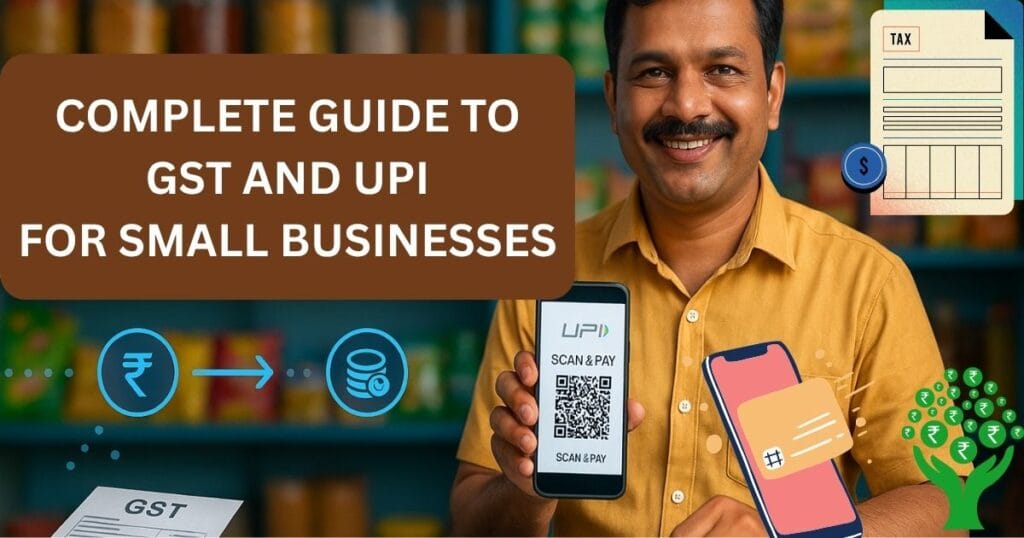If you run a small shop, business, or service, you might have noticed the government keeping a close eye on your cash and UPI payments (like Google Pay, PhonePe, Paytm). Why? The goal is to stop tax evasion and make business transactions more transparent. But what does this mean for you? This article answers all your questions.

Why Is the Government Watching Small Businesses?
Why Focus on Cash and UPI Transactions?
Many small business owners don’t report their full income, especially when dealing in cash. Cash transactions are hard to track, making it easier to hide earnings. On the other hand, UPI transactions leave a digital record, so the government can see exactly how much money you’re making.
- Transparency: UPI payments show your real sales, making it easier for the government to verify.
- Stopping Tax Evasion: Hiding income means less tax for the government, which affects public services like roads and schools.
- Data Importance: The Income Tax and GST departments use this data to ensure you’re paying the right taxes.
Example: If a small grocery shop earns ₹10,000 daily through UPI but reports less in GST returns, the government might suspect tax evasion.
How Is the Government Checking Small Businesses?
Methods to Catch Tax Evasion
The government uses several ways to check if small businesses are following tax rules.
- UPI Data: They ask apps like Google Pay, PhonePe, and Paytm for transaction details.
- GST Portal: Registered businesses must file sales details monthly or quarterly. Any mismatch with UPI data can trigger a notice.
- Surveys and Raids: GST officers visit shops to check records.
- Bank Accounts: They look at deposits and withdrawals to verify your income.
Why Does the Government Want UPI Data?
What Does GST Department Learn from UPI Data?
UPI apps keep a record of every transaction. The government uses this to.
- Track Turnover: See how much you’ve earned from sales or services.
- Spot Mismatches: If your GST returns show less sales than UPI records, it raises red flags.
- Ensure Registration: If your turnover exceeds ₹40 lakh but you’re not GST-registered, you might get a notice.
Legal Basis:
- GST Act: Sections 37 and 39 allow the government to request transaction data.
- RBI Rules: UPI apps must share data when asked.
- Suspicious Activity: Large or unusual transactions trigger scrutiny.
Is Your Data Safe?
UPI data is shared under strict rules. The RBI and NPCI (which runs UPI) ensure your personal details, like name, phone number, or bank account, stay safe. The government only gets necessary info, like transaction amounts and dates. However, if you’re evading taxes, this data can be used to investigate you.
Tip: Keep accurate records and follow GST rules to stay worry-free.
When Is GST Registration Mandatory?
- ₹40 Lakh Turnover: If your annual sales exceed ₹40 lakh in most states.
- ₹20 Lakh Turnover: In special states like Uttarakhand or Manipur.
- Online Sales: If you sell through platforms like Amazon or Flipkart, GST registration is mandatory, regardless of turnover.
Composition Scheme vs. Normal Scheme
| Feature | Composition Scheme | Normal Scheme |
|---|---|---|
| Turnover Limit | Up to ₹1.5 crore (goods) or ₹50 lakh (services) | No limit |
| Tax Rate | 1% (traders), 2% (manufacturers), 5% (restaurants) | 5%, 12%, 18%, 28% |
| Returns | Quarterly (CMP-08, GSTR-4) | Monthly (GSTR-1, GSTR-3B) |
| Input Tax Credit | Not available | Available |
| Restrictions | No interstate sales | No restrictions |
Which to Choose?
- Composition: Easier for small businesses, with lower taxes and simpler compliance.
- Normal: Better for larger businesses needing input tax credit or interstate sales.
Penalty for Not Registering for GST
If your turnover exceeds ₹40 lakh and you don’t register for GST.
- Fine: ₹10,000 or 10% of the tax evaded, whichever is higher.
- Interest: 18% per year on unpaid tax.
- Legal Action: Repeated violations could lead to shop sealing or court cases.
Example: If you sell ₹5 lakh worth of goods without paying GST, you might owe ₹90,000 (18% GST) plus a penalty.
Why Are Shopkeepers Avoiding UPI?
Many shopkeepers hesitate to accept UPI because.
- Fear of GST Notices: UPI leaves a digital trail, making it easier to catch tax evasion.
- Lack of Awareness: Some don’t fully understand GST rules.
- Past Notices: In states like Karnataka, shopkeepers received notices based on UPI data, increasing fear.
Example: A tea stall earning ₹5,000 daily via UPI but not registered for GST could face a notice if turnover exceeds ₹40 lakh.
Do You Pay GST Immediately on UPI Payments?
No, UPI payments don’t mean instant GST payment. GST is charged on the goods or services you sell, not the payment method. If you’re GST-registered, you report sales in your returns.
Example: If you sell ₹1,000 worth of goods, you owe 18% GST (₹180), whether paid via UPI or cash.
Tips for Small Businesses
- GST Registration: Register if turnover exceeds ₹40 lakh.
- Accurate Records: Track both cash and UPI transactions.
- Tax Advisor: Consult a CA for guidance.
- Balance Cash and UPI: Cater to customers who prefer cash, but don’t avoid UPI.
- Adopt Digital Payments: UPI builds transparency and helps with loans.
How to Avoid Tax Notices and Penalties
- Timely Returns: File GSTR-1 and GSTR-3B on time.
- Accurate Sales: Report all sales, whether cash or UPI.
- Respond to Notices: Consult a CA immediately if you get a notice.
- Legal Help: Seek a lawyer if needed.
How to Keep Digital Transactions Safe and Legal
- Issue GST Bills: Provide bills for every sale.
- Trusted Apps: Use reliable apps like Google Pay or PhonePe.
- Separate Account: Maintain a dedicated business bank account.
- Security: Keep UPI pins confidential.
READ OFFICIAL PIB (Government of India Press Information Bureau) about GST and UPI
What Is a ‘Large’ Transaction?
There’s no fixed definition, but these can attract attention.
- High Amounts: Transactions worth lakhs in one go.
- Unusual Patterns: Sudden large transactions compared to regular ones.
- Mismatches: If UPI transactions exceed reported GST sales.
Example: Reporting ₹30 lakh turnover but showing ₹50 lakh in UPI transactions could trigger scrutiny.
Is There Tax on UPI Transactions?
UPI transactions themselves don’t attract tax. GST applies to the goods or services sold, regardless of payment method.
Example: A ₹10,000 service with 18% GST means you owe ₹1,800, whether paid via UPI or cash.
When Does Tax Liability Arise on GST and UPI
You face tax liability if.
- Turnover exceeds ₹40 lakh without GST registration.
- You underreport sales.
- You collect GST from customers but don’t pay the government.
Advice for Small Businesses
- Embrace Digital Payments: UPI builds trust and helps with loans.
- Benefits of GST Registration:
- Issue bills to large clients needing tax credit.
- Claim input tax credit to reduce tax burden.
- Appear legitimate and trustworthy.
- Tax-Saving Tips:
- Track expenses (rent, utilities, raw materials) for tax credits.
- Plan annually with a CA.
- Transparency: Accurate records make loans and growth easier.
India’s UPI: The World Champion in Digital Payments
Why are small shopkeepers scared to accept UPI payments?
A lot of shopkeepers worry that accepting UPI payments, like Google Pay or PhonePe, will put them on the government’s radar. Since UPI transactions leave a digital record, the GST department can track their sales easily. If they haven’t registered for GST or are reporting less income than they actually earn, they fear getting a tax notice. For example, a small tea stall owner might avoid UPI because their yearly sales cross ₹40 lakh, and they’re not registered yet. The solution? Get GST registration if your turnover is above the limit and keep clear records to avoid trouble.
Do I have to pay GST right away if I accept UPI payments?
No, you don’t pay GST the moment you get a UPI payment. GST is charged on the goods or services you sell, not on how the customer pays. So, whether you get paid via UPI, cash, or card, you need to report the sale in your GST returns and pay the tax monthly or quarterly, depending on your scheme. For instance, if you sell ₹1,000 worth of clothes with 18% GST, you owe ₹180 in tax, no matter the payment method. Just make sure to issue proper bills and file returns on time!
How can small businesses balance cash and UPI while staying legal?
Balancing cash and UPI is all about keeping customers happy and staying on the right side of tax rules. Some customers love paying with cash for small purchases, so it’s okay to accept it, but too much cash can raise red flags with the GST folks since it’s hard to track. UPI, on the other hand, makes your business look transparent and helps when applying for loans. The trick is to record every transaction—cash or UPI—in a ledger or software, issue GST bills if you’re registered, and file returns on time. Consulting a CA can also save you from headaches down the road!
Conclusion: Balancing Cash and Digital Transactions
Balancing cash and UPI is key because:
- Customer Convenience: Some prefer cash for small transactions.
- Transparency: UPI makes your business credible.
- Safety: Cash carries theft risks; UPI is safer.
- Risk Management: Accurate records, timely returns, and tax advice reduce risks.


